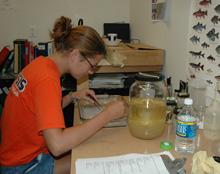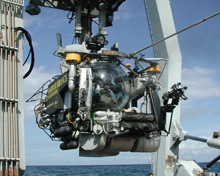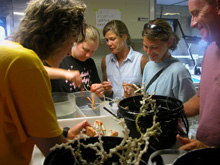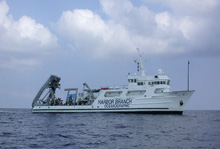
Figure 1. Jennie begins her career sorting plankton in the lab. This is a start but far from the deep sea. Click image for larger view and image credit.
Becoming a Deep Sea Biologist: The Long Path Down
Jennie McClain
University of North Carolina Wilmington
Senior majoring in Marine Biology
Born and raised in Ohio, I surprised my parents when, at 11 years old, I announced that I wanted to be a marine biologist. Now, 10 years later, I am getting ready to embark on the opportunity of a lifetime, my first research cruise! It’s amazing to think how all the little things I did over the years have helped bring me to where I am today.
Starting OutI’ve always been interested in biology as well as the ocean, so it only made sense to study marine biology. I figured a marine biologist was someone who observed fishes, dolphins and sharks, but I did not know what that meant. After I made my decision, I took the next logical step, SCUBA certification. Once certified, I enjoyed a whole new part of the ocean, 30 or 40 feet beneath the surface. My enthusiasm didn’t stop there though. In high school, I went to a marine science summer camp. Again, this opened a whole new world. It was the first time I took classes that involved marine science. It was all fascinating, and I was eager to learn everything I could about the species I observed when snorkeling or diving. I realized then that marine biologists don’t just observe fishes, dolphins and sharks, but conduct research involving behaviors and habitats, but I still had much to learn about the nature of research. I knew I did not want to be like everyone else and work with whales, dolphins or sharks (the popular things), but rather study fishes; perhaps even discover and name a new species of fish. Returning from camp, I knew I had to go to a college with a good marine biology program. With that in mind, I looked at a variety of schools on the East Coast, and I chose UNC Wilmington. Now in college, I realize marine biology consists of different types of marine research covering a broad span of topics. I am learning that science is a complicated process of posing questions or hypotheses about the way the world works and then testing those hypotheses with controlled observations and experiments.
Marine biology is a very competitive field. Good grades in high school are important for acceptance into a decent college. Then, maintaining good grades throughout college helps when job hunting or applying for graduate school. Most importantly, you have to be determined. Many times, people have told me to pursue something else or have a back-up plan, or that it is too difficult to be a marine biologist. I did not let anyone deter me, though. I knew what I wanted to do, and if anything, my determination grew stronger because I wanted to be one of the ones who made it. Aside from good grades and determination, you need to set yourself apart from others. For starters, it is helpful to narrow your areas of interest. I have many friends who wanted to work with dolphins, turtles or sharks, but I wanted to do something else. Early on, I decided I wanted to become a deep-sea biologist. I was amazed by the fact that we know more about parts of outer space than the deep ocean. The ocean is vast, and there is still much to learn, especially in deep-sea environments. I am determined to see parts of the ocean that few others have seen and to study environments that we know so little about. I may not know yet what I want my “specialty” to be, but I know there are many exciting possibilities and I am keeping an open mind.
Getting InvolvedGetting involved early on in your career is the most important step in becoming a marine biologist. Universities across the country graduate hundreds of students every year with marine biology degrees. So how can you set yourself apart from the hundreds of other marine biology graduates? My answer: get involved. Volunteering in a research lab helps you gain crucial experience. In my case, I hit the jackpot in my sophomore year. I heard that a professor (Dr. Steve Ross) who conducts deep-sea research was looking for volunteers to help in his lab. In an interview, I explained I was a hard worker and would do whatever was needed; thus began my next step in becoming a marine biologist. I began at the “bottom of the totem pole,” writing final museum labels and sorting plankton samples for fish larvae and leptocephali. But, once I became established, I began working on more exciting projects. In my junior year, I did a directed independent study on the ecology of a deep-sea crab, Eumunida picta. I used video analysis to look at habitats and behaviors of these galatheid crabs (see Nizinski essay). I loved every minute of my work because not only did I get to see things few others have, but I learned more about this species than other researchers in my lab did, so I was the expert. My hard work lead to a summer job, where I continued to collect data on these crabs, leading to a publication. Knowing that I helped contribute to the scientific world is very exciting.
In addition to volunteering, it is important for any future biologist to ask questions. Marine biologists are always trying to discover new aspects about the ocean environment. During my directed independent study, I constantly asked questions such as: “What’s this fish?” or “Why does this fish do that?” Questions like these lead to future research and eventual answers. The answers increase our understanding of the ocean ecosystem and lead to more new questions. In fact, all research begins when someone asks why. It is constant questioning that keeps areas of marine biology, like in the deep-sea, open for new people to conduct new research. Remember, knowledge only comes to those who seek it, so don’t be afraid to ask who, what, when, where, or why.

Figure 4. Relatively few scientists get the opportunity to see first hand the deep sea beyond SCUBA depths. Manned submersibles, such as Harbor Branch Oceanographic Institute’s Johnson-Sea-Link (being launched), are an important tool in allowing us to accurately gather data in deep waters. Click image for larger view and image credit.
Going to Sea
Research cruises are a common part of marine biology. They allow marine biologist to collect data, in hopes of answering the many questions associated with the marine world. Typically, only graduate students and senior scientists participate in these expensive excursions. Undergraduates lack the experience and connections needed to participate in a cruise. Luckily, after two years of working for Dr. Ross, I am embarking on the opportunity of a lifetime. Even though I will miss three weeks of classes, the things I will learn on this adventure will be priceless. Learning skills such as reading sonar, handling nets or night lighting will improve my resume when applying for a job. In addition to this, I may have the chance to go down in the submarine. This would be a dream come true. Only a few people in the world get to go down 1,000 feet or more to explore the unknown, and the chance that I could be one leaves me speechless. Regardless of whether or not I do get to dive, every minute of the cruise will add precious experience to my life and bring me closer to my future goals.
All this time volunteering and helping with a research project has really opened doors for me. I acquired skills that others in my classes have not, which gives me an edge. The experience alone is priceless. It also gives me the chance to see if I really enjoy the practice of marine biology (it is one thing to read and another to do). After all this time, I’ve realized how much I love research and being a part of a laboratory. I am fortunate for these opportunities. They will only add to my credentials. It is definitely the next big step on my journey to becoming a deep-sea biologist.



























